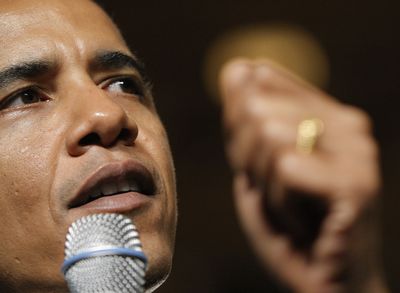Obama’s unprecedented trip overseas packs high stakes

What Barack Obama is to do in the coming days sounds like a no-brainer for a presumptive nominee with limited foreign-policy experience.
Go overseas. Visit the troops. Drop by the Middle East. Hobnob with major European leaders. Try to avoid gaffes. Look presidential.
Except that historians say no one in his position has done it before.
Not Jimmy Carter in 1976. Or Ronald Reagan in 1980. Or Michael Dukakis in 1988, Bill Clinton in 1992, George W. Bush in 2000.
Then again, none of them was trying to get elected president in a time of war.
“If Obama says he represents a new politics, he’s certainly smashing an old paradigm by going,” said presidential historian Douglas Brinkley, of Rice University. “And for 10 days, he’ll own the media. It’s gigantic for him.”
The Democratic candidate, in his continuing attempt to establish his national-security credentials in a post-Sept. 11 world, is embarking on an expedition that reportedly will take him to Iraq, Afghanistan, Jordan, Israel, Germany, France and Britain.
Exactly when he’s going and where isn’t altogether clear. For reasons of security, official details have been closely guarded. It is known that the three main network news anchors will be with him next week.
Many analysts have described the journey as a savvy move in Obama’s campaign against Republican John McCain – even though it comes with risks attached.
“This is a high-stakes trip,” said veteran Democratic political consultant Robert Shrum. “But voters understand that for America to be strong in the world it’s important to have a president who handles himself well and is liked and admired overseas. And I think that’s what we’ll see with Obama.”
Republican strategist John Feehery highlighted the potential downsides.
“It diverts people from the big issue in the campaign, which is the economy, and it elevates the issues of experience and credentials and whom Americans trust on Iraq, which are strengths for McCain and not Obama,” Feehery said. “This is fraught with peril for him.”
By traveling overseas and visiting the war zones – that part is considered official Senate business, the rest a campaign trip – Obama is trying to address the reservations some voters have about his limited national security resume.
In a Washington Post/ABC News poll out this week, McCain outscored Obama 63 percent to 26 percent on which candidate has better knowledge of world affairs.
Almost three-quarters of respondents said McCain would be a good commander in chief; fewer than half said the same of Obama.
Such voter concerns are among the most significant drags on candidacy of Obama, even though he leads in the polls, and the trip is one way to quiet them.
This assumes, of course, that his performance abroad is seen as appropriate – not acting as if he already were president, or being overly critical of U.S. policy on foreign soil, or getting embroiled in local disputes – and free of mistakes.
The latter is not a given, as McCain demonstrated in March. The presumptive Republican nominee, in Iraq on a Senate trip, made a widely reported misstatement, saying that Iran was helping al-Qaida operatives in Iraq rather than Shiite extremists.
McCain’s error, which he corrected after a helpful whisper from Sen. Joseph Lieberman, I-Conn., had little lasting impact. But that trip didn’t get the attention this one will.
“If all goes well for Obama, he’ll be able to start chipping away at McCain’s advantages on foreign policy and national security experience,” said Bruce Buchanan, an expert on presidential politics at the University of Texas. “It’s also a way to get the attention of a somnambulant (American) public in the middle of the summer.”
In another time, Obama might have reason to worry about getting a too-enthusiastic response overseas. Foreign support, particularly from Europeans, has not always been seen as a plus for U.S. presidential candidates. In 2004, Democrat John Kerry was ridiculed for having French relatives and roots.
But now the image of the U.S. in the world is not good, and analysts say Americans are eager to see it improve. So pictures of adoring crowds abroad, should they materialize, might be a political asset at home.
In the Washington Post/ABC News Poll, Obama beat McCain 2-1 when voters were asked which candidate would do more for the U.S. image internationally.
Republicans say Obama was goaded into this trip, at least part of it.
Two months ago, the McCain campaign started providing a count, updated daily, of how long it had been since Obama had been to Iraq (now more than 920 days) as well as constant reminders that he’d never been to Afghanistan. McCain even offered to accompany Obama to Iraq.
Beyond that, McCain’s supporters claim that the visit to Iraq is pure show for Obama; he pledged again this week to withdraw the bulk of U.S. troops within 16 months of taking office.
“Let’s drop the pretense that this is a fact-finding trip and call it what it is: the first-of-its-kind campaign rally overseas,” Jill Hazelbaker, McCain’s spokeswoman, said on Fox News on Thursday.
McCain, who said Thursday that he welcomes Obama’s travels, has made several foreign trips since announcing presidential candidacy 15 months ago, most of them on Senate business.
In the last month, he’s made campaign visits to Canada, Colombia and Mexico, trying to highlight his ability to deal with foreign leaders and concerns.
He hasn’t, however, done anything as big as what Obama is about to do.
“It’s a huge event and probably a net plus for Obama,” said Allan Lichtman, a political historian at American University. “McCain couldn’t duplicate it because he wouldn’t get the same kind of reception abroad.”
“It is a gamble, but one worth the risk,” Buchanan said. “To shoot for the job of president is the biggest gamble in American politics.”